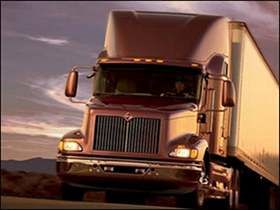Questions
Topic 8362 | Page 2
On top of that, local driving is not considered OTR experience. So a driver who has been local for 2 years will still most likely have to go through some form of training. Though the training is usually shortened. Every company handles it differently.
I know this isn't what you were asking but it's just additional information,
What's the difference in driving local verse otr? It's still the same tractor trailer but obviously different truck name, I don't know some things doesn't make sense to me.
On top of that, local driving is not considered OTR experience
Probably another thing controlled by Insurance requirements.
OTR:
Over The Road
OTR driving normally means you'll be hauling freight to various customers throughout your company's hauling region. It often entails being gone from home for two to three weeks at a time.
Why do some trucking companies want you to go back to driving school if you already have your class A license but never used it? Even when some trucking companies have a student training for drivers who need training but you have to go back to a driving school? I don't understand it.
I don't think it's so much about the trucking companies requirements so much as insurance requirements.
I'm not sure. Thanks for your opinion. I applied to a trucking company and since I had my cdl class A license and it's valid but I never used it I would have to go back to some approved trucking school for 240 hours and maybe I would be hired. Then if I'm hired I would have to go with a trainer for 240 hours or so then I'll be able to go solo. My question is doesn't going out with a trainer for 240 hours enough? That's what I don't understand.
CDL:
Commercial Driver's License (CDL)
A CDL is required to drive any of the following vehicles:
- Any combination of vehicles with a gross combined weight rating (GCWR) of 26,001 or more pounds, providing the gross vehicle weight rating (GVWR) of the vehicle being towed is in excess of 10,000 pounds.
- Any single vehicle with a GVWR of 26,001 or more pounds, or any such vehicle towing another not in excess of 10,000 pounds.
- Any vehicle, regardless of size, designed to transport 16 or more persons, including the driver.
- Any vehicle required by federal regulations to be placarded while transporting hazardous materials.

Tim are you sure they meant 240 hours at the refresher course? Was in school with a guy who had 5 years otr and he had been out of driving for 3 years. He had to take a 40 refresher for the company he was going with.
Either way 30 8 hour days seems a bit excessive for someone who has already passed the course.
OTR:
Over The Road
OTR driving normally means you'll be hauling freight to various customers throughout your company's hauling region. It often entails being gone from home for two to three weeks at a time.

On top of that, local driving is not considered OTR experience. So a driver who has been local for 2 years will still most likely have to go through some form of training. Though the training is usually shortened. Every company handles it differently.
I know this isn't what you were asking but it's just additional information,
Does that function inversely? Is it a one-way street? Would a person who has 2yrs OTR be qualified for a local position, and be exempt from extraneous 'training?'
OTR:
Over The Road
OTR driving normally means you'll be hauling freight to various customers throughout your company's hauling region. It often entails being gone from home for two to three weeks at a time.
Tim are you sure they meant 240 hours at the refresher course? Was in school with a guy who had 5 years otr and he had been out of driving for 3 years. He had to take a 40 refresher for the company he was going with.
Either way 30 8 hour days seems a bit excessive for someone who has already passed the course.
Hi there, well I don't have any experience, I got my cdl a few years ago and decided not to use it but now I want to use it.
CDL:
Commercial Driver's License (CDL)
A CDL is required to drive any of the following vehicles:
- Any combination of vehicles with a gross combined weight rating (GCWR) of 26,001 or more pounds, providing the gross vehicle weight rating (GVWR) of the vehicle being towed is in excess of 10,000 pounds.
- Any single vehicle with a GVWR of 26,001 or more pounds, or any such vehicle towing another not in excess of 10,000 pounds.
- Any vehicle, regardless of size, designed to transport 16 or more persons, including the driver.
- Any vehicle required by federal regulations to be placarded while transporting hazardous materials.
OTR:
Over The Road
OTR driving normally means you'll be hauling freight to various customers throughout your company's hauling region. It often entails being gone from home for two to three weeks at a time.

I believe USX will hire you if you completed school any less than five years ago, and there is no additional training requirement. I'm sure others do the same, especially when demand for drivers goes on a little upswing.
New Reply:
New! Check out our help videos for a better understanding of our forum features

















Preview:
This topic has the following tags:
Attending Truck Driving School CDL Qualifications Getting Your CDL Truck Driver Training








 TT On Facebook
TT On Facebook
Whoops. looks like Daneil B beat me to this with his comment basically the same. Guess I should check for updates when I write a reply and then forget to hit submit until later. LOL
BMI:
Body mass index (BMI)
BMI is a formula that uses weight and height to estimate body fat. For most people, BMI provides a reasonable estimate of body fat. The BMI's biggest weakness is that it doesn't consider individual factors such as bone or muscle mass. BMI may:
It's quite common, especially for men, to fall into the "overweight" category if you happen to be stronger than average. If you're pretty strong but in good shape then pay no attention.